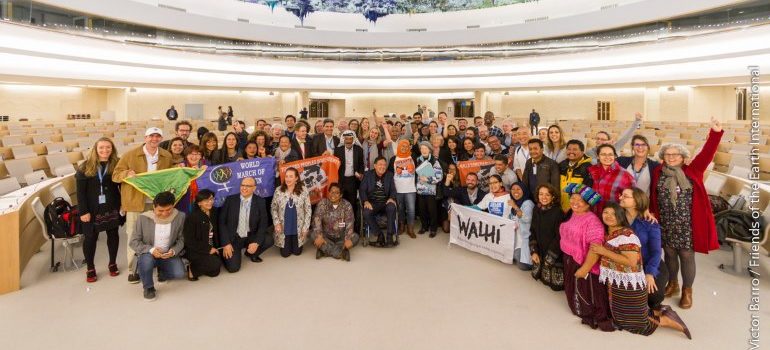
The content of a legally binding treaty on transnational corporations (TNCs) was discussed during the second session of the United Nations Intergovernmental Working Group.
The second session of the Open-Ended Intergovernmental Working Group on Transnational Corporations and Other Business Enterprises with Respect to Human Rights was held in October 2016 in Geneva. (The first session had been held in July 2015.) This working group, created by a Human Rights Council resolution in 2014, was chaired by the Ecuadorian ambassador María Fernanda Espinosa.
The discussions were organized around six themes (and several sub-themes) in the course of which some thirty panelists (politicians, lawyers, international organization members, academicians and representatives of both civil society and business) took the floor. They spoke on the content, the scope and the implementation mechanism of the future treaty. The accent was on the human rights repercussions and legal problems posed by TNCs, the extraterritorial obligations of states, the responsibilities and obligations of TNCs, the scope of the future treaty’s implementation, and access to justice and to compensation for the victims.
Numerous social movements (notably peasants and trade unions) and organizations from affected communities, members of the Global Campaign to Dismantle the Power of Transnational Corporations and End Impunity (of which the CETIM is a member) were present to support the process, make their demands heard and formulate concrete proposals. Besides the six written statements (in three languages), a total of more than 40 oral interventions were made by the CETIM and other Global Campaign organization members. The content of these interventions referred to the concrete proposals submitted by the Global Campaign to the Working Group, in the form of written statements. These statements constitute the guidelines of the Global Campaign, which demands their inclusion in the treaty-drafting process in order that it reflect the needs of the peoples who daily suffer from the actions of TNCs.
Many state delegations also participated in the session and its discussions. The European Union, which last year had tried to derail the process and had left the room, was among the participants this time. That said, the EU’s horizon remains limited to Professor John Ruggie’s voluntary guidelines, and it continues to oppose the adoption of binding norms for TNCs.
Yet, the failings of these guidelines and their voluntary character have long been discussed and denounced by the Global Campaign and other civil society organizations as well as by several countries of the Global South.
Whether or not to bring all business enterprises (particularly small- and medium-size businesses) under the scope of the treaty was also discussed. As national small- and medium-size businesses already come under national legislation, the speakers (states and civil society), with rare exceptions, defended the idea that only TNCs and the elements of their value chain having transnational scope, hence benefiting from the absence of legislation, should come under the purview of the treaty. In fact, only TNCs benefit from special statutes allowing them to escape from legal action in the event of problems and only they can force states into litigation before private arbitration tribunals.
The obligation of governments to hold TNCs responsible in the event of human rights violations, irrespective of the place where they are committed (covered by the notion of extraterritoriality) was also one of the main subjects under discussion.
Cases of impunity and communities affected by TNCs’ activities were presented to illustrate the necessity of a binding treaty. Existing international conventions, covering the obligations of private actors in various areas (e.g. fight against tobacco, environmental standards, law of the sea) were mentioned as an example for the continuation of negotiations.
The Global Campaign also insisted on the necessity of making the rights of TNC victims a central part of the treaty by assuring them an avenue of effective redress at both the national and international level.
Thus, the concrete proposals presented during these two sessions of the Working Group will facilitate the orientation of the future treaty whose first draft should be presented by the Working Group chair at the third session in 2017.
The CETIM and members of the Global Campaign were also very much present outside the United Nations building during a week of mobilization organized on the occasion the Working Group’s second session.